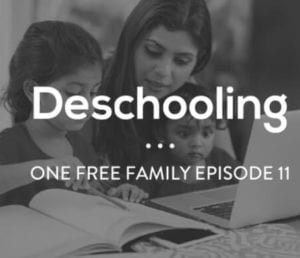 “My son would just play video games all day!”
“My son would just play video games all day!”
I recently received an email from an old friend of mine who has a 10 year old son. He was very curious about our approach to helping our children educate themselves, but also felt fearful about trying the same thing with his own son.
“I’m just not sure if he’s motivated enough to be self-directed in his education, you know? I just think he’d sit around playing video games all day instead of really learning anything.”
When I followed up asking why he thought that way, he said that that was what his son currently did when given any free time, and figured that would translate directly into how he would spend all of his time if he were self directed.
There’s so much going on here that I thought it might be interesting to unpack it more thoroughly in a blog post.
Understanding Deschooling
As a proponent of self-directed education, it might surprise you to know that I actually do think that his son would likely sit down and play video games for a while, at least at the beginning. Countless people that have transitioned into a freer life go through this phase, one that unschoolers call “deschooling.”
When people are finally given autonomy, they don’t always know what to do with it – at first. Whereas video games (or texting, or watching Netflix, or whatever) used to be a distraction from the generally unpleasant day-to-day of having to do what other people wanted, now those activities can be pursued at all times. At first, they seem like a satisfying way to spend every moment. But as veteran unschoolers have found, this situation rarely lasts.
Autonomy Leads to Exploration
Why is this the case? Well, almost no activity is satisfying enough to do at all times. The best shows on Netflix eventually end, video games can ultimately be conquered (or at least progress stops being made), and the human mind will begin to seek stimulation in other ways. I also believe that the person is basically trying to prove to itself that it really can do whatever it wants without interference. It can take a while to become truly satisfied that, indeed, a person has regained his or her autonomy.
This decompression period can take longer if the person in question was involved in forced education for a long time, but eventually it does fade. The young person becomes content in the knowledge that they have regained ownership over their own life, and they begin to more thoroughly explore what the world has to offer. As I’ve written in other posts, this will naturally mean the young person will pursue friendships, find their passions, and want a good life for themselves.
Deschooling Ourselves
Like many things, though, we can’t expect immediate results. I ultimately steered my friend away from pursuing the self-directed learning path at this time, simply because he didn’t seem emotionally ready to sign up for everything it entails. We’ve been told from the moment that we are born that the current educational paradigm is the way it is for good reasons. We’re made to feel fearful that straying from this path is dangerous, that even taking summer breaks can cause “summer learning loss,” and that our job as adults is to keep a steady hand and move our children through the intentionally arduous process of forced schooling.
In a lot of ways, a healthy unschooling environment starts by deschooling ourselves. We need to be pretty well convinced that our children’s lives belong to them before we turn their lives back over to them. If we are too fearful, we might try to help our children be self-directed, only to change our minds weeks later. We might unintentionally convey to our children that they are not to be trusted, that they will mess things up if they are left to their own devices, and that they can only make good decisions for themselves if we are heavily involved in the decision making process.
Believing in Our Children
My hope is that parents start by doing work on themselves to determine what messages they hope to convey to their children. I have seen that children, by and large, often live up to the expectations placed upon them. When we tell our children a story that they are lazy, or unproductive, or would fail without us, we can’t be surprised when they feel the same way. When we learn to believe in our children, and we believe it so fully that we turn their lives over to them, we shouldn’t be surprised if they begin to believe in themselves as well.

